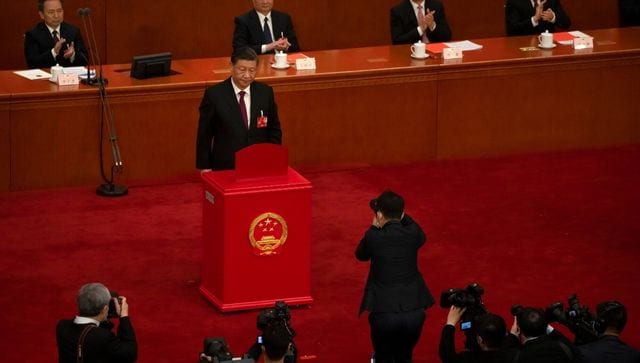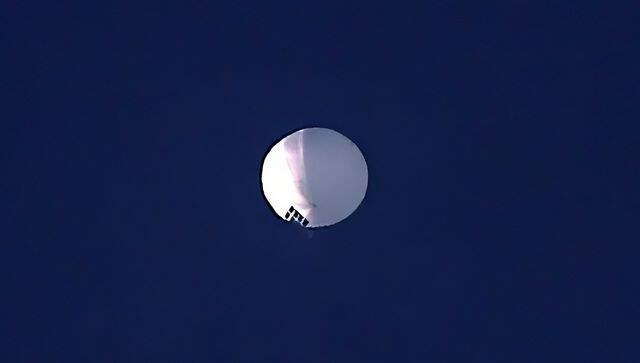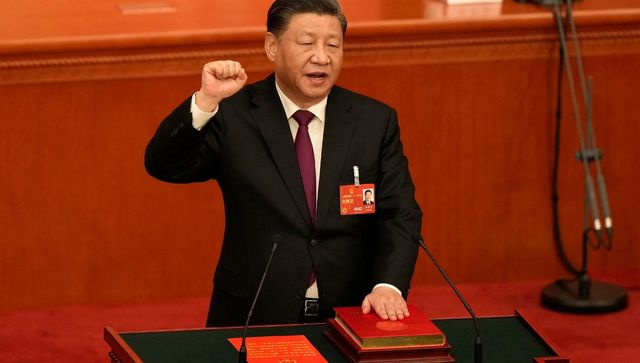Xi Jinping took oath as China’s president for a third time on Friday (10 March), becoming the country’s most powerful leader since Mao Zedong. The National People’s Congress, which is described as China’s “rubber-stamp” parliament by Western media, voted 2,952 to 0 in favour of Xi’s third five-year term. In his oath, which was streamed live on state television, the Chinese leader pledged to “build a prosperous, strong, democratic, civilised, harmonious and great modern socialist country”, reported The Guardian. This comes after Xi was awarded the third five-year term as party general secretary and head of the country’s military commission for a third term at the 20th Communist Party Congress last October. What will Xi Jinping’s third term as president mean for China, India and the rest of the world? Let’s find out. Solidifying one-man rule Xi’s third-year term has put him on the track to stay in power for life. He has amalgamated power by appointing loyalists to the country’s top posts and snuffing out any opposition. Earlier in 2018, Xi had brought in constitutional reform to remove term limits on the presidency, a sign of him having no plans to relinquish power after a decade of his tenure. His predecessors Jiang Zemin and Hu Jintao had adhered to the two-term limit. Associated Press (AP) notes that Xi’s term and filling of top posts with loyalists underlines his “near-total monopoly on Chinese political power, eliminating any potential opposition to his hyper-nationalistic agenda of building China into the top political, military and economic rival to the US and the chief authoritarian challenge to the Washington-led democratic world order.” [caption id=“attachment_12270312” align=“alignnone” width=“640”] Earlier, Xi Jinping had brought in constitutional reform to remove term limits on the presidency. AP[/caption] In the coming two days, Li Qiang, the ruling party’s second-highest official and Xi ally, is expected to replace Li Keqiang as premier. This will make Xi’s acolyte the caretaker of the world’s second-largest economy. “Under Xi the party and government have been pushed together. The government has become less distinct and less effective,” Richard McGregor, a senior fellow at the Lowy Institute think tank, and author of a book about the Chinese Communist Party (CCP), told The Guardian. Moreover, China has already stripped Hong Kong of its autonomy and judicial independence. It has jailed all pro-democracy party leaders, and put so-called “patriots” in charge to run the city. Economic challenges China’s economy, which was hit due to pandemic-induced lockdowns and other strict measures, has gained some momentum after the sudden abandonment of the zero-COVID strategy at the end of last year. Now, Xi’s job is to put the economy fully back on track.
Earlier, Xi Jinping had brought in constitutional reform to remove term limits on the presidency. AP[/caption] In the coming two days, Li Qiang, the ruling party’s second-highest official and Xi ally, is expected to replace Li Keqiang as premier. This will make Xi’s acolyte the caretaker of the world’s second-largest economy. “Under Xi the party and government have been pushed together. The government has become less distinct and less effective,” Richard McGregor, a senior fellow at the Lowy Institute think tank, and author of a book about the Chinese Communist Party (CCP), told The Guardian. Moreover, China has already stripped Hong Kong of its autonomy and judicial independence. It has jailed all pro-democracy party leaders, and put so-called “patriots” in charge to run the city. Economic challenges China’s economy, which was hit due to pandemic-induced lockdowns and other strict measures, has gained some momentum after the sudden abandonment of the zero-COVID strategy at the end of last year. Now, Xi’s job is to put the economy fully back on track.
On Sunday, at the opening of the annual NPC session, outgoing premier Li Keqiang set the growth target at “around 5 per cent” for 2023.
Last year, China’s growth plunged to 3 per cent, severely missing the official target of “around 5.5 per cent”. Li also emphasised on enhancing consumer spending by ramping up household incomes but did not outline a detailed plan for it. Further, the premier called for “building up our country’s strength and self-reliance in science and technology”. The country has also decided to form a financial regulatory body and national data bureau. In the past years, China has cracked down on several industries , including technology, education and real estate, under Xi’s “common prosperity” drive to “keep income distribution and the means of accumulating wealth well-regulated”, thus spooking investors. Xi also faces the challenge of weak global demand for exports, a falling birth rate, as well as a “battle of dominance” over technology with the United States.
“In his third term, Xi will need to focus on economic revival,” Willy Lam, senior fellow at the Jamestown Foundation, a US think tank, told Reuters.
“But if he continues with what he has been doing - tighter party and state control over the private sector and confrontation with the West, his prospects for success won’t be encouraging.”
Human rights Xi has almost eliminated all opposition to his government. Several activists have fled the country under his rule. Rights groups say over a million Uyghurs and other Muslim minorities are being kept in detention camps in Xinjiang, which the United States and some Western countries say amounts to “genocide”, reported AFP. The situation is unlikely to change during Xi’s new tenure. Taiwan issue China has decided to up its military spending by more than 7 per cent this year. Announcing the decision, the outgoing premier said on Sunday that the “external attempts to suppress and contain China are escalating”. In the past 10 years, Beijing has surged its defence budget by about 10 per cent each year, with the highest rise in 2014 at 12.2 per cent, as per BBC.
China has the world’s second-highest military spending after the US.
The development has come at a time when tensions between the United States and China are high over several issues, including Taiwan. The relationship further deteriorated after the then US House Speaker Nancy Pelosi visited Taiwan last year, prompting an angry China to conduct its biggest military drills around the island in years. China has also been regularly sending warplanes and warships to “intimidate” Taiwan, says AP. Recently, two Chinese ships were blamed for cutting internet cables leading to Matsu, one of Taiwan’s outlying islands. According to AFP, “an emboldened Xi could decide the time is right to fulfil Beijing’s longstanding ambition of seizing the self-ruled democratic island”. Fears of China invading Taiwan have worried the world, especially the West, since Russia’s war in Ukraine. If China does launch a military offensive against the island nation, it could have a devastating impact on global supply chains and worsen Beijing’s relationship with the West. It could also bring the US and China closer than ever to first-hand military confrontation, as per AFP. Sour relations with the US The ties between the US and China have soured over the previous years on account of multiple issues including trade, technology, Taiwan, human rights and the origins of COVID-19. The relationship further tanked after a planned visit by US Secretary of State Antony Blinken last month was called off after a Chinese balloon, which Washington claims was used for carrying out surveillance, was found over the US territory. China has vehemently rejected the charge. [caption id=“attachment_12270332” align=“alignnone” width=“640”] The US and China ties took a nosedive after the balloon incident. AP File Photo[/caption] During the ongoing
Two Sessions
annual meetings, Beijing sharpened its attack on the US. Addressing delegates at the Chinese People’s Political Consultative Conference (CPPCC), Xi – in a rare direct condemnation of America – said, “Western countries led by the United States have implemented all-round containment, encirclement and suppression of China, which has brought unprecedented grave challenges to our nation’s development.” He further said that China must “have the courage to fight as the country faces profound and complex changes in both the domestic and international landscape”, reported The Guardian. As per AP, in his first news conference since being appointed as China’s foreign minister last year, Qin Gang said this Tuesday: “If the United States does not hit the brake, but continues to speed down the wrong path, no amount of guardrails can prevent derailing and there surely will be conflict and confrontation”. Amid the myriad challenges, Ian Chong, a political scientist at the National University Singapore, told BBC, that “Xi is betting that centralisation under the party with him at the helm is a solution to these disparate issues”. What does it mean for India?
China’s ‘aggressive’ international stance is expected to continue
under Xi. Tensions have ratcheted up between India and China since the Galwan Valley clashes at eastern Ladakh in June 2020 which caused the death of 20 Indian soldiers. Border tensions have dampened the relations between the two countries for the last few years. Manoj Joshi, a journalist specialising on national and international politics, wrote for Hindustan Times last October: “A feature of Xi’s rule has been to persist with policies regardless of the blowback, whether it is concerning its economy, Taiwan, the South China Sea, zero-Covid, or the Indian border. A third, and possibly fourth term, could lead to Xi moving Chinese policies into a dangerous rut.” “A third Xi term is only likely to reinforce the trends associated with his tenure — assertiveness abroad, no compromises on issues relating to China’s boundaries, and a willingness to use the military as an instrument of policy,” Joshi added. India’s gradual progress on the economic front and “strategic patience” can counter the challenge posed by China, an Indian Express report said last year. The report also stated that India and China have different “fundamental values”, and hence, New Delhi’s interests “will be in conflict” with that of Beijing’s. As per the Atlantic Council report last year, five more years of Xi’s leadership could mean five more years of “increasing conflict with many of the world’s major economic and military powers”, as well as “emerging nations that feel threatened by Beijing’s aggressiveness” such as India. With inputs from agencies Read all the
Latest News
,
Trending News
,
Cricket News
,
Bollywood News
, India News
and
Entertainment News
here. Follow us on
Facebook
,
Twitter
and
Instagram
.
The US and China ties took a nosedive after the balloon incident. AP File Photo[/caption] During the ongoing
Two Sessions
annual meetings, Beijing sharpened its attack on the US. Addressing delegates at the Chinese People’s Political Consultative Conference (CPPCC), Xi – in a rare direct condemnation of America – said, “Western countries led by the United States have implemented all-round containment, encirclement and suppression of China, which has brought unprecedented grave challenges to our nation’s development.” He further said that China must “have the courage to fight as the country faces profound and complex changes in both the domestic and international landscape”, reported The Guardian. As per AP, in his first news conference since being appointed as China’s foreign minister last year, Qin Gang said this Tuesday: “If the United States does not hit the brake, but continues to speed down the wrong path, no amount of guardrails can prevent derailing and there surely will be conflict and confrontation”. Amid the myriad challenges, Ian Chong, a political scientist at the National University Singapore, told BBC, that “Xi is betting that centralisation under the party with him at the helm is a solution to these disparate issues”. What does it mean for India?
China’s ‘aggressive’ international stance is expected to continue
under Xi. Tensions have ratcheted up between India and China since the Galwan Valley clashes at eastern Ladakh in June 2020 which caused the death of 20 Indian soldiers. Border tensions have dampened the relations between the two countries for the last few years. Manoj Joshi, a journalist specialising on national and international politics, wrote for Hindustan Times last October: “A feature of Xi’s rule has been to persist with policies regardless of the blowback, whether it is concerning its economy, Taiwan, the South China Sea, zero-Covid, or the Indian border. A third, and possibly fourth term, could lead to Xi moving Chinese policies into a dangerous rut.” “A third Xi term is only likely to reinforce the trends associated with his tenure — assertiveness abroad, no compromises on issues relating to China’s boundaries, and a willingness to use the military as an instrument of policy,” Joshi added. India’s gradual progress on the economic front and “strategic patience” can counter the challenge posed by China, an Indian Express report said last year. The report also stated that India and China have different “fundamental values”, and hence, New Delhi’s interests “will be in conflict” with that of Beijing’s. As per the Atlantic Council report last year, five more years of Xi’s leadership could mean five more years of “increasing conflict with many of the world’s major economic and military powers”, as well as “emerging nations that feel threatened by Beijing’s aggressiveness” such as India. With inputs from agencies Read all the
Latest News
,
Trending News
,
Cricket News
,
Bollywood News
, India News
and
Entertainment News
here. Follow us on
Facebook
,
Twitter
and
Instagram
.
)